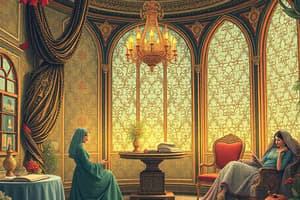Podcast
Questions and Answers
What is the primary function of literature according to the text?
What is the primary function of literature according to the text?
- To communicate human emotions, thoughts, and experiences (correct)
- To teach language and grammar rules
- To entertain readers with captivating stories
- To provide historical facts and information
Which characteristic does 'suggestedness' in literary standards refer to?
Which characteristic does 'suggestedness' in literary standards refer to?
- The ability of literature to entertain and amuse readers
- The permanence of literary works over time
- The power of literature to convey hidden truths through symbolism and implied meanings (correct)
- The intellectual stimulation provided by reading literature
What aspect of literature does 'spiritual value' focus on?
What aspect of literature does 'spiritual value' focus on?
- The timeless nature of literary works
- The distinct style of authors in expressing their thoughts
- Its ability to entertain readers with engaging narratives
- The power of literature to inspire and uplift the inner spirit (correct)
Why is 'permanence' considered a significant literary standard?
Why is 'permanence' considered a significant literary standard?
Which characteristic of literature ensures its 'universality'?
Which characteristic of literature ensures its 'universality'?
What does 'artistry' in literature primarily focus on?
What does 'artistry' in literature primarily focus on?
What is the main purpose of FICTION literature?
What is the main purpose of FICTION literature?
Which literary approach believes that language is not a stable entity?
Which literary approach believes that language is not a stable entity?
In which literary form does language use lines, stanzas, and rhyme scheme to depict poetic sounds and emotions?
In which literary form does language use lines, stanzas, and rhyme scheme to depict poetic sounds and emotions?
What does Feminist Criticism primarily seek to do in literature?
What does Feminist Criticism primarily seek to do in literature?
Which literary model focuses on exploring and interpreting cultural, political, and historical contexts of a text?
Which literary model focuses on exploring and interpreting cultural, political, and historical contexts of a text?
According to New Criticism, where should understanding of a text come from?
According to New Criticism, where should understanding of a text come from?
What is the main characteristic of PROSE literature?
What is the main characteristic of PROSE literature?
Which literary approach emphasizes understanding the motivations of characters and symbolic meanings of events?
Which literary approach emphasizes understanding the motivations of characters and symbolic meanings of events?
What does Queer Theory focus on in literary texts?
What does Queer Theory focus on in literary texts?
Which literary approach views the text as a self-contained entity requiring no external interpretation?
Which literary approach views the text as a self-contained entity requiring no external interpretation?
Flashcards are hidden until you start studying
Study Notes
World Literature
- World literature is the written and verbal expression of human feelings, thoughts, and ideas whose medium is language.
- It is a medium for humans to communicate what they feel, think, and experience to readers, transferring human experiences.
Literary Standards
- Suggestiveness: evokes emotions, defines symbolism, and implies meanings beyond ordinary life and experiences.
- Spiritual Value: motivates and inspires, drawing from suggested morals and lessons in different literary genres.
- Permanence: endures across time, standing the test of time, and has both timeliness and timelessness.
- Universality: appeals to everyone regardless of culture, race, sex, and time.
- Style: a distinct way of expressing thoughts, appealing to hearts and minds, and crossing gender, racial, and cultural barriers.
- Artistry: has aesthetic appeal, conveying hidden truths and beauty, and possessing a sense of beauty in writing.
- Intellectual Value: stimulates critical thinking, enriching mental processes, and making readers realize fundamental truths of life.
Classification of Literature
- Structure: Fiction (imaginative narration) and Non-Fiction (real-life narration based on history and facts).
- Genre: Literary Approaches, including Fiction, Poetry, Essay, Drama/Play, and Arts.
Literary Approaches
- Deconstructionism: language is not a stable entity, and we can never exactly say what we mean.
- Poetry: uses lines, stanzas, and rhyme scheme to depict poetic sounds and emotions.
- Drama/Play: script-literary composition and dramatic performance.
- Arts: includes paintings, drawings, music, and dances.
Main Divisions of Literature
- Prose: written in common flow of language, conveying information, expressing ideas, or presenting opinions.
- Poetry: uses lines, stanzas, and rhyme scheme to depict poetic sounds and emotions.
Literary Criticism
- Feminist Criticism: corrects predominantly male-dominated critical perspective with a feminist consciousness.
- Marxist Criticism: uses language influenced by social class and economics to make ideological statements.
- New Criticism: views the text as a self-contained entity, requiring no interpretation beyond the text.
- New Historicism: considers the literary text as part of a larger social and historical context.
- Literary Models: Cultural Model, Literary Model, Personal Growth Model, Psychological Criticism, and Queer Theory/Gender Studies.
Literary Models
- Cultural Model: explores and interprets social, political, literary, and historical contexts of a specific text.
- Literary Model: promotes language development like vocabulary and structure.
- Personal Growth Model: achieves lasting pleasure and deep satisfaction in reading.
- Psychological Criticism: explores human consciousness, motivations of characters, and symbolic meanings of events.
- Queer Theory/Gender Studies: questions and problematizes gender identity and sexual orientation in literary texts, respecting different identities.
- Reader-Response Criticism: focuses on the reader's individual experience with a text, considering what the reader felt from reading.
Studying That Suits You
Use AI to generate personalized quizzes and flashcards to suit your learning preferences.




